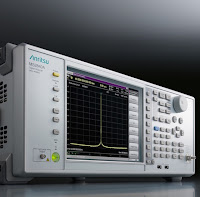Pulse radars must always operate accurately and reliably because they are used widely for meteorological, shipping, coastguard, and aerospace monitoring applications as important social infrastructure assuring safety and security on land and sea, and in the air.
Inspection of the Tx characteristics is key for stable pulse-radar operation and conventionally requires various test instruments, including a separate spectrum analyzer, oscilloscope, power meter, and frequency counter. In particular, when testing Tx spurious emissions, field engineers must create spectrum emission masks (pass/fail base lines) using results from several pieces of test instruments, which is time consuming. Moreover, more private weather forecasting businesses are installing high-performance pulse radar that is essential for monitoring increasingly frequent severe weather, such as sudden downpour and linear rainband causing heavy rain and flooding. Consequently, demand for pulse-radar maintenance testing is also increasing. However, the shortage of experienced field engineers may be unable to meet this rising test demand, which creates a need for automated shorter field tests using easily portable test instruments.
Analyzer Outline.
The MX284059B is configured easily in combination with the MS2840A and MA24406A/18A/40A to support tests of Tx characteristics and replaces the four conventionally required pieces of test instruments. Additionally, all test stages from data acquisition to spectrum emission mask creation are fully automated.
In comparison to its predecessor MX284059A, the MX284059B has a wider pulse-width measurement range for testing high-performance radar, including aerospace and maritime applications using short pulses as well as long-range radar using long-repetition cycles (long pulses).
Key Features.
- S-, C-, X-, and Ku-band (3 to 15 GHz band) pulse-radar Tx tests
- Automatic tests of Tx power and frequency, pulse width, pulse rise/fall times and repetition frequency, 40 dB bandwidth, and spurious emissions, with integrated saving of measured data, measurement screens, and pass/fail results
- Evaluation of spurious emissions test results using masks based on the Recommendation ITU-R SM.329, SM.1541 and M.1177 with masks superimposed on MS2840A test trace display
* See also Releases in 2016 & 2021 for other developments in this instrument.




















No comments:
Post a Comment